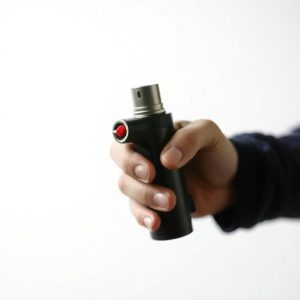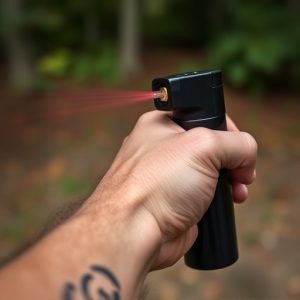How to Treat Pepper Spray Exposure: Immediate Care and Prevention
How to Treat Pepper Spray Exposure:1. Immediate Steps: Evade the source, move to a safe area, remove…….
How to Treat Pepper Spray Exposure:
1. Immediate Steps: Evade the source, move to a safe area, remove contaminated clothing carefully, and flush eyes with water for 15 minutes.
2. Breathing Difficulties: Seek fresh air if breathing is affected.
3. Skin & Eye Care: Wash skin with mild soap and perform eye irrigation.
4. Long-term Care: Stay hydrated, use gentle skincare products, carry portable eye wash, and schedule regular check-ups with healthcare professionals.
5. Medical Attention: Seek medical help if symptoms persist or worsen, as prescription medication may be required.
“Aerosol spray, a powerful defense against potential attackers, can be a lifesaver in high-risk situations. This article equips you with essential knowledge on how to handle pepper spray exposure and its effects. We’ll guide you through immediate actions to take after coming into contact with the spray, offering practical tips for self-care and long-term prevention strategies. Learn how to effectively manage symptoms and protect yourself from future incidents, ensuring your safety and peace of mind. Discover the key steps in treating pepper spray exposure, enabling you to stay prepared.”
- Understanding Pepper Spray and Its Effects
- Immediate Actions After Exposure
- Long-term Care and Prevention Strategies
Understanding Pepper Spray and Its Effects
Pepper spray, an aerosol defense mechanism, is a powerful tool designed to temporarily incapacitate attackers. It functions by delivering capsaicin, the active ingredient found in chili peppers, into the eyes and respiratory system. This irritant causes intense burning sensations, reduced visibility, coughing, and difficulty breathing, allowing the user valuable time to escape or defend themselves.
Understanding how pepper spray works is crucial when learning how to treat pepper spray exposure. In case of accidental contact, immediate steps should be taken. Remove any contaminated clothing, wash eyes thoroughly with water for at least 15 minutes, and seek fresh air. Medical attention may be required if symptoms persist or severe irritation occurs. Knowing these precautions can help mitigate the effects of exposure and ensure proper handling of such situations.
Immediate Actions After Exposure
If you’ve been exposed to pepper spray, the first step is to immediately get away from the source and move to a safe, open space. This is crucial as it helps prevent further exposure and allows your eyes and respiratory system to start recovering. Remove any clothing or accessories that may have come into contact with the spray, being careful not to rub or wipe the affected areas, as this can spread the irritants further.
Next, flush your eyes gently but thoroughly with clean water for at least 15 minutes. This will help to dilute and wash away the pepper spray chemicals. If you’re experiencing difficulty breathing, seek fresh air immediately and try deep breathing exercises or use any available rescue equipment. Wash any affected skin areas with mild soap and water. How to treat pepper spray exposure also involves staying calm and monitoring your symptoms. Seek medical attention if your symptoms persist or worsen, as some people may require prescription medications to ease the discomfort and irritation caused by the spray.
Long-term Care and Prevention Strategies
Long-term Care and Prevention Strategies for Pepper Spray Exposure
After an attack, seeking immediate medical attention is crucial to treat pepper spray exposure. The first steps involve washing affected areas with plenty of water to dilute the chemical irritants. This should be done gently to avoid further irritation. Additionally, removing any contaminated clothing or accessories is essential to prevent prolonged skin contact. Eye irrigation with clean water for at least 15 minutes is recommended to alleviate eye irritation and discomfort.
For long-term care, staying hydrated and avoiding strenuous activities can help the body recover faster. Using mild, fragrance-free soaps and moisturizers can soothe irritated skin. Individuals should also consider carrying a portable eye wash solution for quick on-the-go treatment if they anticipate being in high-risk areas. Lastly, regular check-ups with healthcare professionals are vital to monitor any potential health effects from exposure to pepper spray over time.
Pepper spray can be a powerful tool for self-defense, but it’s crucial to understand its effects and know how to properly treat exposure. By understanding the immediate actions to take after exposure, as well as long-term care and prevention strategies, you can ensure safety and minimize discomfort. Remember, knowing How to Treat Pepper Spray Exposure is vital for effective self-protection.


